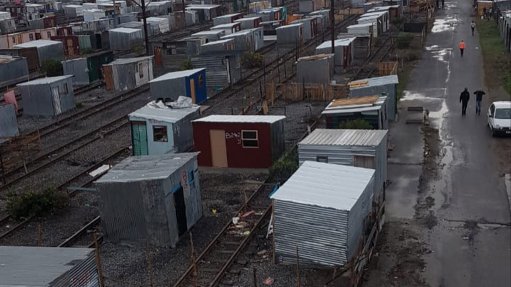
Rail infrastructure in Philippi in the Western Cape
Photo by: UNTU
The United National Transport Union (Untu) wants the Passenger Rail Agency of South Africa (PRASA) to be moved from the Department of Transport (DoT) to the Department of Public Enterprises (DPE), says Untu spokesperson Sonja Carstens.
This will place the entity where it belongs – under the same management as other State-owned enterprises.
“If what is happening at PRASA, happened at South Africa Airways (SAA), people – government – would be jumping up and down, but this is not happening because it’s the poor making use of Metrorail.”
PRASA operates the Metrorail commuter service.
Untu is the largest trade union at Prasa.
Moving PRASA away from the DoT will allow for separation from its regulator, the Railway Safety Regulator (RSR), which also resides under the authority of the DoT.
“This makes it very difficult for the RSR to act against the wishes of its boss, the Minister of Transport,” says Carstens. “The Civil Aviation Authority resides with the DoT, while SAA falls under the DPE, for example.”
Untu also want PRASA to return to the Transnet fold.
PRASA seperated from Transnet in 2006.
“It makes no sense to separate the two. They use exactly the same infrastructure,” says Carstens.
Untu also opposes the devolution of Metrorail services to provincial or municipal government, as is currently proposed by the White Paper on National Rail Policy.
“They will not be able to solve the problems facing Metrorail alone,” she emphasises. “It will take a massive, collective, national effort to resurrect the ailing PRASA. No single stakeholder will manage on its own.”
PRASA ridership has lost en estimated 50% of its ridership over the last four years owing to unreliable and unsafe operations, with the bulk of these commuters now on the road, and using taxi’s – adding to the congestion woes on South Africa’s roads.
The list of ailments at the State-owned commuter rail operations are plentiful. They include the suspension of several executives on the suspicion of a number of transgressions, continuous cable theft, sabotage of the signalling system, on-train criminal activity, trains being set alight or catching fire owing to electric faults, massive delays on the system, as well as numerous accidents.
The arrival of new rolling stock will not solve PRASA’s problem, adds Carstens, as it is one cog in a failing system.
The Gibela consortium has been tasked with delivering 600 new passenger trains to PRASA in a R59-billion deal signed in 2014. Delivery of the first new locally built train happened in December last year.
As part of a national effort to revive PRASA, Untu would want to see deployment of the South African National Defence Force on the system, says Carstens.
“They don’t need to act as a police service, but they are able to protect the country’s infrastructure. We have to stop the spiral of decline. If the army can look after the infrastructure, we can start modernising what we have, otherwise we’ll never move forward.”
Untu also fails to understand why the full extent of the law is not used when PRASA’s infrastructure is torched or sabotaged.
“The Criminal Matters Amendment Act allows for up to 25 years behind bars when this happens, yet no one in the criminal justice system is working to implement these sentences,” says Carstens.
In an effort to force the State’s hand in improving the Metrorail service and resurrecting PRASA, the Federation of Unions of South Africa (Fedusa) has secured a certificate to strike from the steering committee of the National Economic Development and Labour Council.
Untu is an affiliate of Fedusa.
“Untu will now embark on mobilising other interest groups, communities and other trade unions to support Fedusa with its planned strike to force President Cyril Ramaphosa to take action,” says Untu general secretary Steve Harris.
The strike may be called for July.